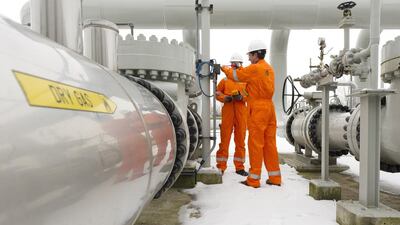Tough competition for the most qualified Emiratis could hamper Abu Dhabi National Energy, the oil, gas and power producer warned in a bond prospectus yesterday.
Taqa launched meetings yesterday with global fixed-income investors for a planned bond that would be used to pay off a US$1.2 billion bond maturing in September. It secured a $200 million samurai loan earlier this month to go towards the refinancing.
The company issued a 180 million euro, 10-year bond in a private placement arranged by Societe Generale, Taqa confirmed yesterday. The coupon was 2.75 per cent.
Among the risks Taqa outlined in the new prospectus was keeping up with Emiratisation targets.
“Taqa and its UAE subsidiaries are broadly in compliance with their targets for levels of Emirati employees; however, competition for suitable, qualified Emirati employees is intense and recruiting sufficient numbers of Emirati employees to comply with applicable targets may be challenging for these companies,” the company wrote in its prospectus. “An inability to recruit, train or retain necessary personnel could have a material adverse effect on the group’s business, financial condition and results of operations.”
Today a fifth of employees are Emirati at Taqa, whose operations span oil exploration in Iraqi Kurdistan, power production in Ghana and gas storage in the Netherlands. Last fall it hosted 60 Emirati students at a recruitment programme in Scotland, where it pumps North Sea oil.
Other risks detailed in the prospectus included Scotland’s upcoming referendum on independence and the potential reintroduction of an Opec quota on Iraq.
Long exempted from the group’s output targets during years of war and sanctions, Iraq was brought back under the production ceiling in 2011. Individual output targets were eliminated at the same time, but pressure is growing to keep the group’s production under check with resurgent production. This year production hit a 35-year high of 3.6 million barrels per day.
“The Kurdish Regional Government may not consider itself bound by Opec quotas, potentially contributing to the tensions that already exist around group assets in the region ... and any resulting overproduction could result in adverse treatment by Opec,” said Taqa.
ayee@thenational.ae

